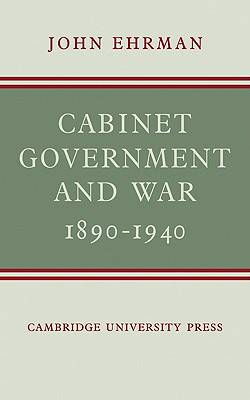
- Afhalen na 1 uur in een winkel met voorraad
- Gratis thuislevering in België vanaf € 30
- Ruim aanbod met 7 miljoen producten
- Afhalen na 1 uur in een winkel met voorraad
- Gratis thuislevering in België vanaf € 30
- Ruim aanbod met 7 miljoen producten
Zoeken
Omschrijving
This book was originally published in 1958. John Ehrman shows that the nature and range of government in Great Britain was transformed by the two world wars. At the end of the nineteenth century the administrative system barely recognised the demands of war. In the two wars it had to be capable of mobilising the whole resources of the country and the Commonwealth, and this affected the scope of government in peace: almost every aspect of national life was subject to supervision. Yet this profound change did less in Britain than elsewhere to destroy the country's traditions and institutions. Mr Ehrman shows that the Cabinet Government retained its basic features and traditional strength. This book is based on the Lees Knowles Lectures given at Cambridge in 1957. Historians will find it gives important information about the conduct of the last war, against the constitutional background necessary for its understanding.
Specificaties
Betrokkenen
- Auteur(s):
- Uitgeverij:
Inhoud
- Aantal bladzijden:
- 152
- Taal:
- Engels
Eigenschappen
- Productcode (EAN):
- 9780521141222
- Verschijningsdatum:
- 25/03/2010
- Uitvoering:
- Paperback
- Formaat:
- Trade paperback (VS)
- Afmetingen:
- 127 mm x 203 mm
- Gewicht:
- 172 g

Alleen bij Standaard Boekhandel
+ 121 punten op je klantenkaart van Standaard Boekhandel
Beoordelingen
We publiceren alleen reviews die voldoen aan de voorwaarden voor reviews. Bekijk onze voorwaarden voor reviews.











